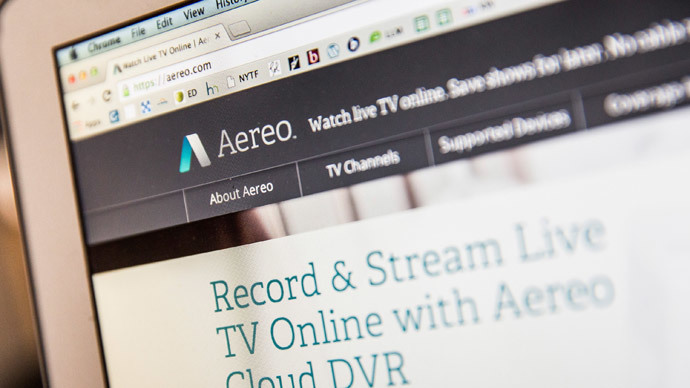Aereo streaming TV service deemed illegal by Supreme Court

The Supreme Court ruled on Wednesday that the streaming TV service Aereo operates in violation of copyright law and is, therefore, illegal.
In a 6-3 ruling, the justices reversed a previous decision by the Second Circuit in which that court found Aereo to be lawfully within the limits of the 1976 Copyright Act.
The crux of the case centered on whether or not the service is considered a “public performance.” Major broadcasting networks claimed Aereo broke copyright law by giving users the ability to tap into television channels, record broadcasts and then transcode them in order to essentially watch live programming via remote, rented mini-antennas. Broadcasters said that by retransmitting live programming without paying the associated fees a cable company would – and by collecting monthly fees from customers – the startup was operating illegally.
For its part, Aereo argued that the company itself did not stream anything to its customers as a whole, therefore making any performance private instead of public. The company supplied equipment – the antenna and cloud storage space – and it was users themselves who individually relied on their antennas to record and watch television channels, much like they’d be able to if they bought their own antenna and installed it on their TV.
In its ruling, the Supreme Court concluded that although Aereo’s equipment does not deliver live services unless a customer orders it to, the company was much more like a cable company than it was a simple equipment provider.
"In other cases involving different kinds of service or technology providers, a user's involvement in the operation of the provider's equipment and selection of the content transmitted may well bear on whether the provider performs within the meaning of the Act,” the ruling reads. “But the many similarities between Aereo and cable companies … convince us that this difference is not critical here."
As noted by Fox News, US copyright law defines a cable system as “a facility, located in any State, territory, trust territory or possession of the United States, that in whole or in part receives signals transmitted or programs broadcast by one or more television broadcast stations licensed by the Federal Communications Commission, and makes secondary transmissions of such signals or programs by wires, cables, microwave or other communications channels to subscribing members of the public who pay for such service."
Additionally, The Wire reported that Justice Stephen Breyer, who wrote the majority opinion for the high court, reasoned that the service Aereo provides falls within the Copyright Act’s transmit clause and constitutes public, not private, performance.
“The subscribers to whom Aereo transmits television programs constitute ‘the public,’” he wrote. “This is because Aereo communicates the same contemporaneously perceptible images and sounds to a large number of people who are unrelated and unknown to each other.”
“This matters because, although the Act does not define “the public,” it specifies that an entity performs publicly when it performs at ‘any place where a substantial number of persons outside of a normal circle of a family and its social acquaintances is gathered.’ Ibid. The Act thereby suggests that ‘the public’ consists of a large group of people outside of a family and friends.”
Justice Antonin Scalia wrote the dissent, which was joined by Justices Samuel Alito and Clarence Thomas. Together, the three concluded “that Aereo does not perform at all,” according to SCOTUSblog.
“The Court manages to reach the opposite conclusion only by disregarding widely accepted rules for service-provider liability and adopting in their place an improvised standard (‘looks-like-cable-TV’) that will sow confusion for years to come,” Scalia wrote.
During oral arguments, the justices also expressed concern over whether or not a ruling in favor of broadcasters would have negative consequences and stifle future innovation related to the cloud, but in the final ruling Breyer expressed confidence that their opinion is narrow enough to not endanger the burgeoning industry or other technological services.
“We agree that Congress, while intending the Transmit Clause to apply broadly to cable companies and their equivalents, did not intend to discourage or to control the emergence or use of different kinds of technologies,” he wrote. “But we do not believe that our limited holding today will have that effect.”
He also wrote that regarding the term “the public,” the court believes “it does not extend to those who act as owners or possessors of the relevant product. And we have not considered whether the public performance right is infringed when the user of a service pays primarily for something other than the transmission of copyrighted works, such as the remote storage of content… In addition, an entity does not transmit to the public if it does not transmit to a substantial number of people outside of a family and its social circle.”
Nevertheless, the ruling could have a devastating impact on the future of Aereo. As noted by Re/code, company CEO Chet Kanojia previously stated there was no “Plan B” if the Supreme Court ruled against it, meaning Aereo would likely have to shut down.
"Today’s decision by the United States Supreme Court is a massive setback for the American consumer," Kanojia said in a statement following Wednesday’s ruling. "We’ve said all along that we worked diligently to create a technology that complies with the law, but today’s decision clearly states that how the technology works does not matter. This sends a chilling message to the technology industry."
Ahead of this week’s ruling, the startup raised about $100 million from investors.













